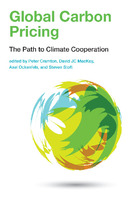Global Carbon Pricing
The Path to Climate Cooperation
Contributor(s)
Cramton, Peter (editor)
MacKay, David JC (editor)
Ockenfels, Axel (editor)
Stoft, Steven (editor)
Language
EnglishAbstract
Why the traditional “pledge and review” climate agreements have failed, and how carbon pricing, based on trust and reciprocity, could succeed.After twenty-five years of failure, climate negotiations continue to use a “pledge and review” approach: countries pledge (almost anything), subject to (unenforced) review. This approach ignores everything we know about human cooperation. In this book, leading economists describe an alternate model for climate agreements, drawing on the work of the late Nobel laureate Elinor Ostrom and others. They show that a “common commitment” scheme is more effective than an “individual commitment” scheme; the latter depends on altruism while the former involves reciprocity (“we will if you will”).The contributors propose that global carbon pricing is the best candidate for a reciprocal common commitment in climate negotiations. Each country would commit to placing charges on carbon emissions sufficient to match an agreed global price formula. The contributors show that carbon pricing would facilitate negotiations and enforcement, improve efficiency and flexibility, and make other climate policies more effective. Additionally, they analyze the failings of the 2015 Paris climate conference.ContributorsRichard N. Cooper, Peter Cramton, Ottmar Edenhofer, Christian Gollier, Éloi Laurent, David JC MacKay, William Nordhaus, Axel Ockenfels, Joseph E. Stiglitz, Steven Stoft, Jean Tirole, Martin L. Weitzman
Keywords
emissions; clean air; climate change; environmental economics; CO2; greenhouse gases; Paris Agreement; free rider problemISBN
9780262036269OCN
1100541198Publisher
The MIT PressPublisher website
https://mitpress.mit.edu/Publication date and place
Cambridge, 2017Classification
Environmental economics


 Download
Download